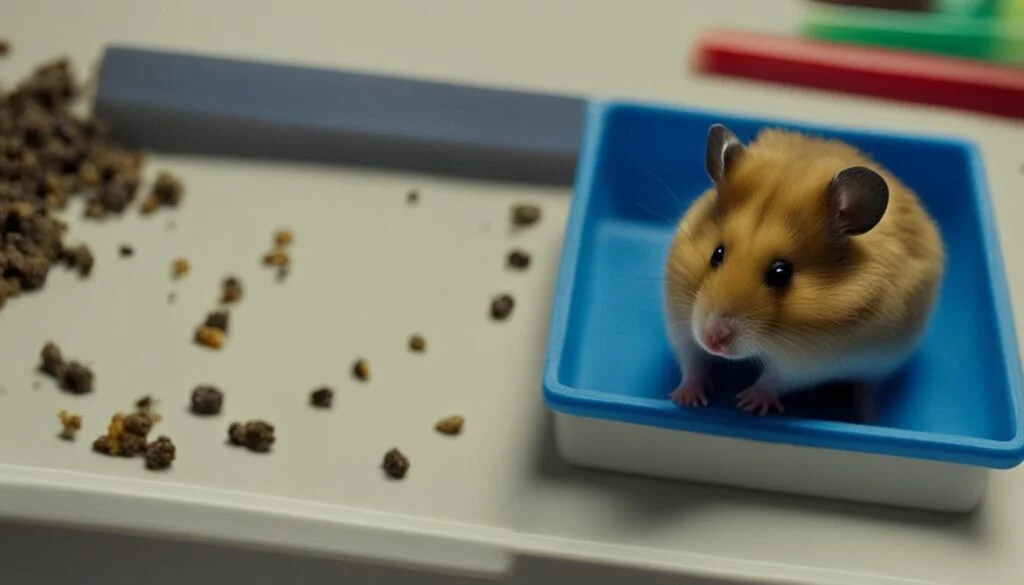Did you know that hamsters can produce an astounding amount of poop every day? On average, a hamster can leave behind 50 to 100 droppings within just a few hours! Yes, you read that right. These tiny creatures have quite the digestive system.
If you find yourself wondering why your hamster is pooping so much, you’re not alone. Excessive hamster poop can be a cause for concern, but it’s important to understand the reasons behind it and to know when it’s a sign of digestive issues.
In this article, we’ll explore the factors that contribute to your hamster’s frequent poop production, what healthy hamster poop looks like, and how you can manage and regulate their pooping habits. So, let’s dive in and get to the bottom of your furry friend’s pooping mystery!
Factors That Affect a Hamster’s Poop
When it comes to your furry friend’s digestive system, several factors can influence their poop frequency and consistency. It’s essential to understand the reasons behind frequent hamster pooping, as well as how to manage their digestive health effectively.
The Impact of Diet
The type of food your hamster consumes plays a significant role in their pooping habits. Hamsters that have a high-fiber diet, including lots of hay and pellets, will typically poop more frequently. Additionally, if they’re fed an abundance of fresh fruits and vegetables, this can also contribute to increased poop production. It’s essential to balance their diet and monitor their poop to ensure it remains healthy.
Stress Levels and Environmental Factors
Hamsters are sensitive creatures, and stress can affect their digestive system. Factors such as a new environment, the presence of other pets, or loud noises can cause them to poop more frequently. Keep an eye on your hamster’s behavior and try to create a calm and comfortable environment for them to alleviate stress-related pooping.
Age Matters
Hamsters’ poop frequency can vary depending on their age. Younger hamsters tend to poop more than older ones due to their fast metabolism and growing bodies. As they mature, their poop frequency may decrease. Understanding this natural development can help you manage your hamster’s digestive health better.
By understanding these factors, you can better manage your hamster’s digestive system and ensure their overall health and well-being. Monitoring their diet, minimizing stress, and providing a comfortable environment are essential steps in maintaining a happy and healthy hamster.
What Does Healthy Hamster Poop Look Like?
When it comes to assessing your hamster’s health, one important area to pay attention to is their poop. Healthy hamster poop typically has specific characteristics that indicate a well-functioning digestive system.
To start, healthy hamster poop should have a small and solid consistency. It shouldn’t be overly soft or runny. Instead, it should hold its shape and resemble small pellets.
The color of healthy hamster poop is another important indicator. Normally, it should be dark brown or black. This coloration comes from the breakdown of food within their digestive tract and is a sign that their body is absorbing nutrients properly.
Occasionally, feeding your hamster a lot of fresh fruits and vegetables may cause their poop to become slightly moist. This is typically temporary and should return to normal within a few days. However, if their poop remains consistently watery or light-colored, it could be a sign of a health issue.
Identifying Potential Health Concerns
Monitoring your hamster’s poop on a regular basis is crucial for identifying potential health concerns. If you notice any consistent changes in their poop, such as persistent watery consistency, unusual coloration, or an increase in poop frequency, it’s important to consult a veterinarian.
Abnormal poop, along with symptoms like rapid weight loss and lethargy, could be indications of an underlying health problem. Therefore, it’s crucial to pay close attention to your hamster’s overall well-being and seek professional advice if you have any concerns.
Regularly checking your hamster’s poop and being aware of its consistency and color can help you stay proactive in promoting their health and well-being.

Tips for Regulating Hamster Poop
Regulating your hamster’s poop is essential for maintaining their digestive health. By making a few adjustments to their diet and providing a stress-free environment, you can help manage their poop frequency. Here are some tips to help you regulate your hamster’s poop:
1. Adjust their diet
Switching to a lower fiber food can help regulate your hamster’s digestive system and reduce poop frequency. Look for commercial hamster foods with a balanced nutritional profile that contain moderate levels of fiber. Additionally, monitoring the amount of fresh fruits and vegetables you offer can help control their poop output. Limiting these high-fiber foods to small amounts can make a noticeable difference.
2. Create a calm and comfortable environment
Hamsters are sensitive creatures, and stress can impact their digestion and poop habits. Ensure their cage is in a quiet area of your home, away from loud noises and excessive activity. Provide plenty of hideouts and cozy bedding material for them to feel secure. Establishing a routine and minimizing disruptions can help reduce stress-related pooping.
3. Monitor their poop
While frequent pooping is normal for hamsters, it’s important to keep an eye on the consistency and appearance of their poop. Healthy hamster poop should be small, solid, and dark brown or black in color. If you notice any changes like diarrhea, watery poop, or unusual colors, it may indicate a health issue. Contact a veterinarian if you have concerns about your hamster’s poop.
Remember that every hamster is unique, and their digestive system may have its own rhythm. As long as your hamster is maintaining a healthy weight, eating well, and behaving normally, there is typically no cause for concern. By implementing these tips and regularly monitoring their poop, you can ensure your furry friend’s digestive health remains in check.
Cleaning and Litter Training
Keeping your hamster’s cage clean is essential for their overall health and hygiene. Regularly scooping out litter or soiled bedding helps maintain a clean and odor-free environment. Make it a habit to clean their food and water dishes daily to prevent the buildup of bacteria. Additionally, changing the bedding on a weekly basis ensures that your hamster has a fresh and comfortable living space.
Once a month, it’s important to perform a thorough cleaning of the entire cage. Wash all accessories and toys with warm, soapy water, and rinse them thoroughly to remove any residue. This helps prevent the accumulation of dirt and bacteria in their habitat.
Litter training can be a game-changer when it comes to managing hamster poop cleanup. By providing a designated litter box filled with hamster-safe litter or cat litter, you can train your hamster to use it as their bathroom spot. This helps contain the majority of their poop in one area, making cleanup a breeze. Be patient and consistent with the training process, rewarding your hamster with treats for using the litter box.
By maintaining proper cleaning practices and implementing litter training, you create a hygienic environment for both your hamster and yourself. A clean and odor-free cage promotes the health and well-being of your furry friend, while also making your life as a pet owner easier.
